 |
|
|
|
|||||||||||
GUANGZHOU - Nearly two months after losing his bike in South China's Guangdong province, Peng Wei is still upset about the fact that a foreigner who dealt with a similar situation had his bike returned to him by local police within days, whereas he has yet to recover his missing wheels.
Chinese netizens sympathized with him and voiced dissatisfaction with such unequal treatment.
Three months ago, a Japanese tourist lost his bicycle in Central China's city of Wuhan. Police retrieved it four days later, with the help of local people. Peng, on the other hand, is still waiting for police to recover his bike in Dongguan, a manufacturing hub in Guangdong.
Peng, a native of South China's Hainan province, began a large-scale bike trip around China in July 2011. However, his bike was stolen in Dongguan's Dalingshan township on February 28 this year after trekking across more than 10 provinces.
Peng reported the theft to local police the next day, but heard nothing from them until going public with his dilemma. Peng chose to post photos of himself and his bike on the Internet, hoping that netizens would help locate the missing ride.
He also made efforts to contact local media outlets, telling them "I'm not Japanese. My bicycle has been stolen. Can I get it back?"
Eight days later, the Dalingshan township government posted on its official account on Weibo.com, a popular Chinese microblogging site, that the police had begun to investigate the case.
Netizens have criticized the handling of Peng's case, citing the previously mentioned incident involving the Japanese tourist as evidence of unfair treatment.
Peng said he cannot afford another bike because his family is poor, adding that he funded his bike trip by performing odd jobs and playing the saxophone during his travels.
Peng said he didn't expect the public to be so concerned about his case, adding that police have been under great pressure and have tried their best to help him.
Police officers in Dalingshan are investigating the case, with each police station receiving photos of Peng's bicycle to aid them in their search. Some of the officers have gone to salvage stations and bike repair shops to locate the bike, according to Wu Guorong, deputy head of the township's police station.
However, some netizens have stated that local police have failed to find the bike not because of an inability to do so, but an unwillingness to do so.
"It doesn't matter if you're Japanese or not, only if you're foreign, as the probability of retrieving your bike is much higher than for a Chinese person. Why? Because the police want to uphold the image of our nation for foreigners," wrote one netizen using the screenname "cactus" on Weibo.com.
Since the theft of Peng's treasured bicycle was reported, netizens referred to the two incidents again and again, noting they were not so fortunate with their lost property, ranging from bicycles to computers, mobile phones, suitcases, cars and dogs. This feeling of unequal treatment was aggravated later when it was reported that police in Beijing ran 20 kilometers to retrieve a runaway horse for a US citizen.
However, Zhu Lei, director of a research center at Guangdong's Jinan University, interceded for the local government.
"Chinese tradition places importance on helping people from other places or countries, said Zhu.
He also noted that in a Chinese family, parents would scold their child first if the child is involved in a fight with other kids. Such treatment of outsiders and people on their own side has been long deep-rooted in Chinese culture.
It is a "great challenge" when the government faces such a situation (Peng's case) in its work.
He suggested the government should not extend special rights to certain individuals, adding that everyone should be treated equally.
Meanwhile, said Zhu, government officials could also adjust their workstyle, soliciting views of netizens in handling such complicated issues. The government could ask: If you're a law-enforcement officer, what would you do to solve this case?
It is actually unrealistic to search from household to household, considering the large population in the city of Dongguan. Make netizens realize this, he said.
"We have made full efforts in Peng's case. Whether cases involve foreigners or Chinese, we will make our best efforts to solve our cases," said Wu with the township's police station.
Unlike Huaxi, Changjiang keeps low profile as it spreads the wealth
As China still marvels at a small oasis of prosperity and comfort created by its richest village of Huaxi, a powerful competitor has unintentionally stolen the limelight by giving each villager two 100-gram bars of gold and silver.
In mid-March, Changjiang, several hours by car northwest of Shanghai, fulfilled a promise made in 2009 to hand out the valuable metals, worth more than 40,000 yuan ($6,350), to each of its 2,858 permanent residents.
|
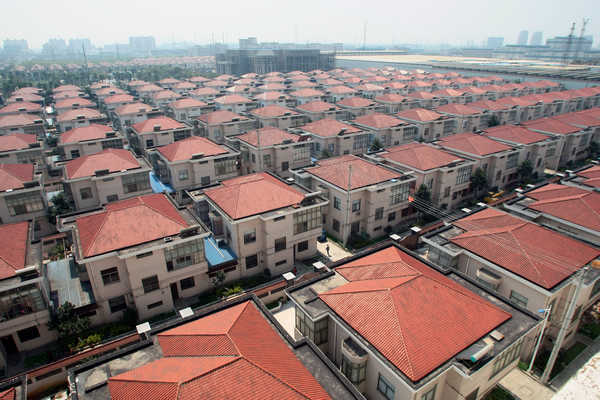 |
|
Rows of villas line the street in Changjiang village, Jiangyin, East China's Jiangsu province. Weng Lei / for China Daily |
The gift, made in celebration of the 40th anniversary of the village-owned Jiangsu Xin Chang Jiang Group, drew enormous attention at a time when China's widening income gap and unfair wealth distribution increasingly cause social problems.
Recent polls by major Chinese news organizations showed that narrowing the income gap is seen as the highest priority topic that must be addressed by the country's leaders.
Yet Changjiang, a 6.5-square-kilometer village not far from the urban center of Jiangyin, seemed untouched by the problem and to be moving toward a utopia where residents share in the common prosperity.
Apart from the gift of gold and silver, residents said they have enjoyed a long list of benefits, including subsidized villas that were sold for 68,000 and 198,000 yuan starting in 2000.
"How is that different from a free handout?" asked Zhang Rongxian, a resident, showing the strikingly similar two-story villas with spacious courtyards.
Other benefits have included occasional handouts of cash, shares in village companies and annual dividends, as well as a quota of free water, electricity, gas and food coupons every month.
But unlike the high profile Huaxi, which also falls under the jurisdiction of Jiangyin in Jiangsu province, village heads stay low-profile about the riches of Changjiang and have turned down almost all interview requests since the village was catapulted to fame when it issued two 100-gram bars of gold and silver to every household (rather than each person) in a preliminary celebration in 2010.
In a 2010 interview, Li Huixia, a public relations official with the Xin Chang Jiang Group, said the gold and silver were given to residents as tangible benefits of the village's prosperity and the value of the metals would appreciate every year, making them even happier.
Due to its low profile, the village sees hardly any tourists on a typical day. It is a modern area where industrial plants and modern dwellings have long replaced farmland, unlike the common notion of what a Chinese village should look like.
In its southern parts stands a gigantic stone gate with five gilded Chinese characters that read "Changjiang Village of China", easily visible from a distance. A major boulevard, flanked by 818 villas in neat rows, divides the village in two.
Utility companies and steel, pipe and ship recycling factories are among the enterprises in the north and far east and west of the village, which is green with plants.
The hospitality common in rural homes is not obvious in Changjiang, where each household locks itself behind bronze gates forged by the village as another gift to residents.
The people go to the village's central park after dusk, said two women from a nearby village.
Busy taking care of their children, they are the only visitors in the morning to the park that has luxury facilities such as tennis courts.
Village patriarch
Like Huaxi, Changjiang was led to prosperity by a revered patriarch, Li Liangbao.
When China embraced reform and opening-up in the 1980s, Changjiang was an agrarian hovel reachable by dirt roads.
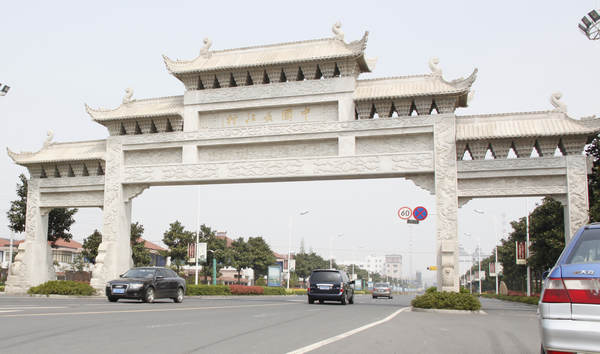 |
|
A stone gate, in the shape of Chinese paifang (memorial archway gate), stands in the south of the village. Wang Zhenghua / China Daily |
Li, then the local Party chief, seized on the new market freedoms to shift its economy from farming to manufacturing, with an initial investment of 700 yuan of collective funds in 1972.
After years of hard work, the diligence of Li and his team is paying off. His two small brick kilns have grown into a conglomerate diversified in iron and steel, fasteners, chemicals, steel tubes and plates, as well as hotel, real estate, logistics, investment and import and export businesses.
In 2011, the Xin Chang Jiang Group, comprising 17 subsidiaries, had 48 billion yuan turnover, placing it 195th among the top 500 businesses in China. By 2015, the group plans to generate 120 billion yuan in sales revenue.
"Only ponder the path to success, and don't seek pretexts for failure," Li said in a slogan, which is printed on the back of a monument in the village's central park, along with more of his beliefs, such as "care about common people and reward society".
Under his leadership, Changjiang has clearly prospered. The villagers get lavish annual stipends, live in spacious single-family homes instead of the country's usual cramped apartments, drive imported cars, and get basic insurance and education.
Everyone owns a piece of the conglomerate, bringing every resident dividends in recent years.
"Compared with Huaxi, the benefits in Changjiang are pretty practical," said Gu Weiming, a local restaurant owner.
The 72-year-old Li Liangbao is honored in the community but is scarcely known to the outside world. Introductory material given by local publicity officials indicate that Li was a workaholic in the past decades.
"To fulfill his promise, he always gets up at around 4 or 5 o'clock in the morning," the material said. "He left footprints at every corner of the village as he inspected factories and construction sites to ensure the scheduled progress and quality were achieved.
"His head was like a computer, his brain as useful as a database."
Safe and sound
Almost every resident approached by China Daily bubbled with joy talking about life in Changjiang. Villagers said they feel safe and live comfortable and leisurely lives.
According to the local police station, in the half month ending March 31, the community saw a total of six thefts and no other crimes.
|
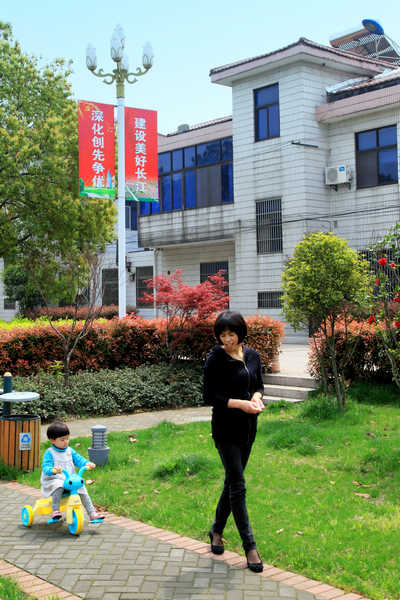 |
|
A villager and her daughter enjoy themselves on a footpath in the village. Li Gen / for China Daily |
Liu Li, an auxiliary police officer at the community police station, said Changjiang is safer than most other areas in Jiangsu.
"Security guards patrol the village three times a day and residents feel safe here," she said.
But in the pursuit common prosperity, individuality and personal choice can suffer.
Families said they could not say no when the village proposed installing identical bronze gates at every household.
Villagers are not allowed to sell the gold and silver bars they were given because they are meant as commemorative items honoring Li, the village patriarch.
A slogan seen around the community reads: "Win honor for the government and don't bring it trouble."
On the political rights of local residents, the latest issue of the group's newspaper suggests that the sessions of workers' congress were held regularly, and Fan Xinglong, the village head, made a work report at the latest session on Feb 20.
"The election of village officials were held regularly," said Cao Jinqing, 66, a retired veterinarian.
"But only those making outstanding contributions to the village and who have a certain prestige could be chosen as candidates for village chiefs," he added.
The prosperity is closely linked to the village-owned group, a family business where Li's three children head a number of its subsidiaries. But few in the village have a clear idea of the share structure of the group.
Along with sharing in the success of these profitable industries, residents have to put up with the potential pollution.
In the west of the village, the Changjiang Steel Pipe plant owned by the group, separated from the living quarters simply by a wall, gives off a pungent odor.
Dividends paid out
Professionals in rural area studies said that the handout of gold and silver bars in Changjiang is just another form of distributing the dividends to involve everyone in the profit and success.
The success stories of the rich villages in East China are similar, they said. These villages seized golden development opportunities, had a capable leader and a management team full of family business features.
"More attention should be given to how to improve the wealth distribution and let the residents have a clear idea of how large a share they own in the collective assets so that they can anticipate such distribution," Du Zhixiong, a rural development institute professor at the Chinese Academy of Social Sciences, said in a recent interview.
Contact the writer at wangzhenghua@chinadaily.com.cn
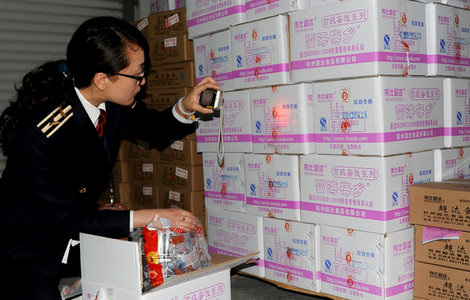
|
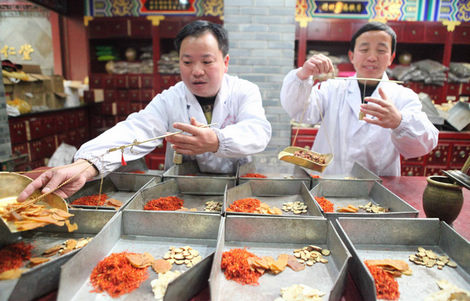
|
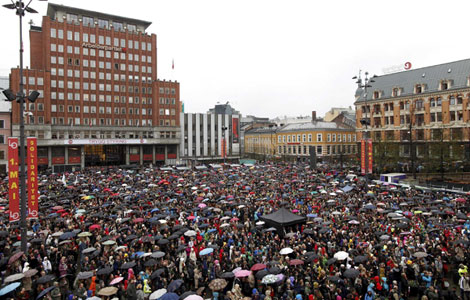
|

|
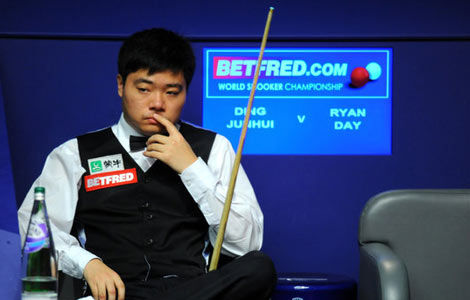
|

|